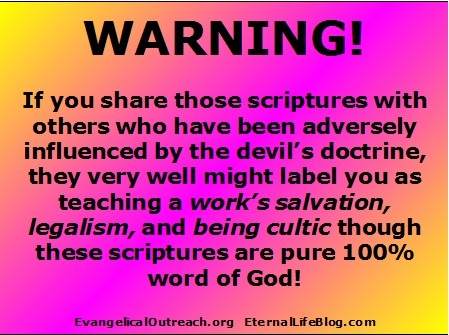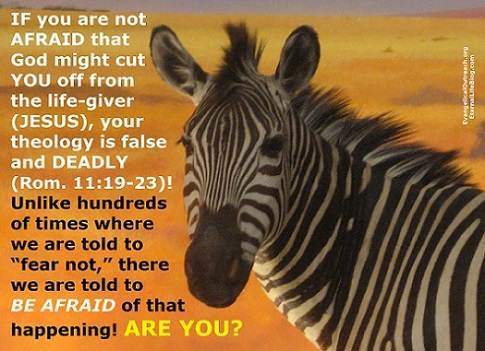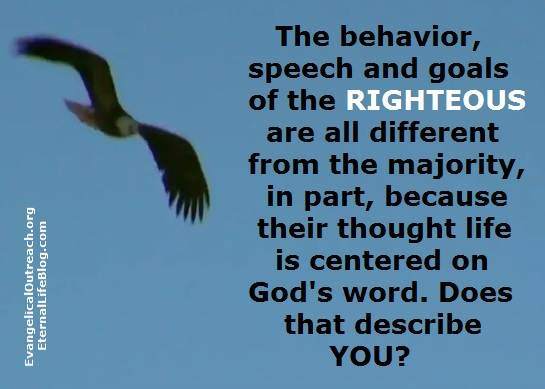We stated in the introduction that Calvinism has its roots in the views of St. Augustine. This man was also largely responsible for the acceptance of a-millennialism into mainstream Christianity, and the Roman Catholic doctrine that the Catholic Church is now God's Kingdom on earth. Prior to his conversion in the fourth century, Augustine was heavily involved in a pseudo-Christian Gnostic cult that held heretical ideas regarding the nature of God as well as the person of Christ. All of the Gnostic cultists were heavily influenced by the writings of the Greek philosophers. And Augustine was no exception.
Prior to the writings of Augustine, the Church universally held that mankind had a totally free will. Each man was responsible before God to accept the Gospel. His ultimate destiny, while fully dependent on God's grace and power, was also dependent on his free choice to submit to or reject God's grace and power. In the three centuries from the Apostles to Augustine the early Church held to NONE of the five points of Calvinism, not one. The writings of the orthodox Church, for the first three centuries, are in stark contrast to the ideas of Augustine and Calvin. Man is fully responsible for his choice to respond to or reject the Gospel. This was considered to be the Apostolic doctrine passed down through the local church elders ordained by the Apostles, and their successors. Below we have listed a few representative quotes from the earlier writers in order to give the flavor of the earliest tradition regarding election and free will. Some deal with the subject of perseverance and apostasy.
Irenaeus (AD120-202)
"This expression [of our Lord], “How often would I have gathered thy children together, and thou wouldest not,” set forth the ancient law of human liberty, because God made man a free [agent] from the beginning, possessing his own power, even as he does his own soul, to obey the behests (ad utendum sententia) of God voluntarily, and not by compulsion of God. For there is no coercion with God, but a good will [towards us] is present with Him continually. And therefore does He give good counsel to all. And in man, as well as in angels, He has placed the power of choice (for angels are rational beings), so that those who had yielded obedience might justly possess what is good, given indeed by God, but preserved by themselves. On the other hand, they who have not obeyed shall, with justice, be not found in possession of the good, and shall receive condign punishment: for God did kindly bestow on them what was good; but they themselves did not diligently keep it, nor deem it something precious, but poured contempt upon His super-eminent goodness. Rejecting therefore the good, and as it were spuing it out, they shall all deservedly incur the just judgment of God, which also the Apostle Paul testifies in his Epistle to the Romans, where he says, “But dost thou despise the riches of His goodness, and patience, and long-suffering, being ignorant that the goodness of God leadeth thee to repentance? But according to thy hardness and impenitent heart, thou treasurest to thyself wrath against the day of wrath, and the revelation of the righteous judgment of God.” “But glory and honor,” he says, “to every one that doeth good.” God therefore has given that which is good, as the apostle tells us in this Epistle, and they who work it shall receive glory and honor, because they have done that which is good when they had it in their power not to do it; but those who do it not shall receive the just judgment of God, because they did not work good when they had it in their power so to do.
"But if some had been made by nature bad, and others good, these latter would not be deserving of praise for being good, for such were they created; nor would the former be reprehensible, for thus they were made [originally]. But since all men are of the same nature, able both to hold fast and to do what is good; and, on the other hand, having also the power to cast it from them and not to do it, — some do justly receive praise even among men who are under the control of good laws (and much more from God), and obtain deserved testimony of their choice of good in general, and of persevering therein; but the others are blamed, and receive a just condemnation, because of their rejection of what is fair and good. And therefore the prophets used to exhort men to what was good, to act justly and to work righteousness, as I have so largely demonstrated, because it is in our power so to do, and because by excessive negligence we might become forgetful, and thus stand in need of that good counsel which the good God has given us to know by means of the prophets. ... No doubt, if any one is unwilling to follow the Gospel itself, it is in his power [to reject it], but it is not expedient. For it is in man’s power to disobey God, and to forfeit what is good; but [such conduct] brings no small amount of injury and mischief. ... But because man is possessed of free will from the beginning, and God is possessed of free will, in whose likeness man was created, advice is always given to him to keep fast the good, which thing is done by means of obedience to God.
"And not merely in works, but also in faith, has God preserved the will of man free and under his own control, saying, “According to thy faith be it unto thee; “ thus showing that there is a faith specially belonging to man, since he has an opinion specially his own. And again, “All things are possible to him that believeth;” and, “Go thy way; and as thou hast believed, so be it done unto thee.” Now all such expressions demonstrate that man is in his own power with respect to faith. And for this reason, “he that believeth in Him has eternal life while he who believeth not the Son hath not eternal life, but the wrath of God shall remain upon him.” In the same manner therefore the Lord, both showing His own goodness, and indicating that man is in his own free will and his own power, said to Jerusalem, “How often have I wished to gather thy children together, as a hen [gathereth] her chickens under her wings, and ye would not! Wherefore your house shall be left unto you desolate.”" (Irenaeus, Against Heresies, Bk. IV, 37)
The above passage is immediately followed by Irenaeus' refutation of the Gnostic cults who "maintain the opposite to these conclusions."
"Has the Word come for the ruin and for the resurrection of many? For the ruin, certainly, of those who do not believe Him, to whom also He has threatened a greater damnation in the judgment-day than that of Sodom and Gomorrah; but for the resurrection of believers, and those who do the will of His Father in heaven. If then the advent of the Son comes indeed alike to all, but is for the purpose of judging, and separating the believing from the unbelieving, since, as those who believe do His will agreeably to their own choice, and as, [also] agreeably to their own choice, the disobedient do not consent to His doctrine; it is manifest that His Father has made all in a like condition, each person having a choice of his own, and a free understanding; and that He has regard to all things, and exercises a providence over all, "making His sun to rise upon the evil and on the good, and sending rain upon the just and unjust."
"And to as many as continue in their love towards God, does He grant communion with Him. But communion with God is life and light, and the enjoyment of all the benefits which He has in store. But on as many as, according to their own choice, depart from God, He inflicts that separation from Himself which they have chosen of their own accord. But separation from God is death, and separation from light is darkness; and separation from God consists in the loss of all the benefits which He has in store. Those, therefore, who cast away by apostasy these forementioned things, being in fact destitute of all good, do experience every kind of punishment. God, however, does not punish them immediately of Himself, but that punishment falls upon them because they are destitute of all that is good. Now, good things are eternal and without end with God, and therefore the loss of these is also eternal and never-ending. It is in this matter just as occurs in the case of a flood of light: those who have blinded themselves, or have been blinded by others, are for ever deprived of the enjoyment of light. It is not, [however], that the light has inflicted upon them the penalty of blindness, but it is that the blindness itself has brought calamity upon them: and therefore the Lord declared, "He that believeth in Me is not condemned," that is, is not separated from God, for he is united to God through faith. On the other hand, He says, "He that believeth not is condemned already, because he has not believed in the name of the only-begotten Son of God;" that is, he separated himself from God of his own accord. "For this is the condemnation, that light is come into this world, and men have loved darkness rather than light. For every one who doeth evil hateth the light, and cometh not to the light, lest his deeds should be reproved. But he that doeth truth cometh to the light, that his deeds may be made manifest, that he has wrought them in God." (Irenaeus, Against Heresies, Bk. V, XXVII)




